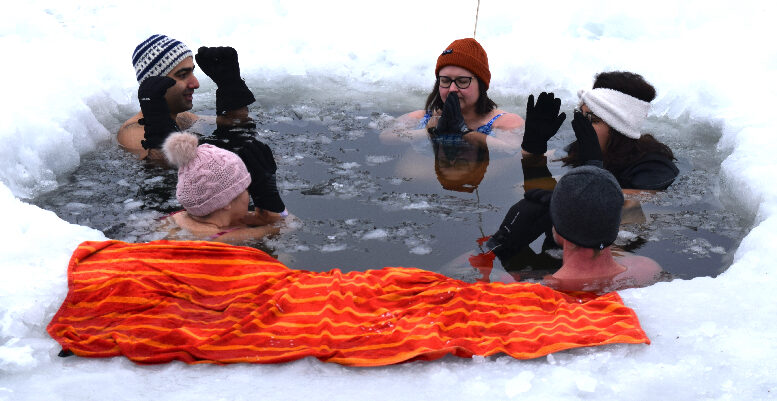Neck deep in a pond is the last place most Newfoundlanders want to be in the middle of winter, but not this group.

Lauren Ella Burke
Kicker
It’s a cold Saturday morning on Signal Hill. The temperature hovers around -2 C and the wind chill makes the air cutting.
In the shadow of Cabot Tower on frozen George’s Pond, a group of more than 15 people are huddled around an opening in the thick ice. After they change into bathing suits, each just slips into the the waist-deep ice water like it’s their bath tub.
It’s called cold-water plunging.
Brent Beshara is the creator of the group and says he started the Newfoundland Winter Tribe five years ago. He became inspired to start facing the cold after retiring from the Canadian Military.
“We’re not resisting the cold, we’re not tolerating the cold, we’re simply adapting to the cold,” said Beshara.
“There shouldn’t be any pain involved.”
The groups members meet up at different ponds and beaches across Newfoundland, says Beshara.
All along Signal Hill, on this particular Saturday, people in their cars and walking by the area stop to stare at the human ice cubes. “That’s crazy” and other words of shock and amusement can be heard from those passing by.
On a nearby trail, Marina Cuselli expressed a few concerns about the activity. But there’s one main reason why she hasn’t tried cold-water plunging.
“I haven’t done it myself because I’m always cold,” said Cuselli.
The benefits of exposure to cold water still need more scientific research. However, there is scientific acknowledgement of potential health benefits according to the article Health effects of voluntary exposure to cold water – a continuing subject of debate.
“I’m sad to see the ice go in the spring time. My first winter here was so bleak and desolate. But now I look forward to it.”
- Brent Beshara
Community guidelines detailing safety procedures are posted to the Newfoundland Winter Tribe’s Facebook group, said Beshara. It’s also suggested people wishing to participate in the activity should consult with a medical professional first since existing medical conditions can be impacted by cold-water plunging.
Beginning with a cold shower and taking a gradual approach, Beshara says is a good way to work up to jumping in and then staying in a frozen pond.
“You can start off with doing 15 seconds and then (work up to) two minutes,” said Beshara. “That’s the protocol when we do the ice plunges. It’s a two minute exposure, that’s all you need to get the health benefits.”
He says every year since 2015 his blood work has gotten better. And he contributes it to dunking himself in ice water on a regular basis.
“The health benefits are profound,” he said, “It helps combat depression, it helps boost our immunity to common colds, it increases our metabolism, it increases our circulation, and reduces inflammation.
“The health benefits can last five to six hours. You feel great.”
Beshara uses the Wim Hof method. Hof, also known as the Iceman, is a motivational speaker who teaches his own methods for breath work and cold exposure.
After attending a workshop with Wim Hof in Toronto, Bershara decided to completed a two-part program and become an instructor. To complete his training he needed to teach at least six classes after finishing the first part in Poland, and then travelled to Amsterdam to complete the second part. In order to do this he created the Newfoundland Winter Tribe on Facebook and invited his family and friends to join his classes.
“We’re almost five thousand members as of today. And it’s a really beautiful community,” said Beshara.
“It’s all inclusive and everyone is welcome.”
Some of the members wear special gloves and shoes, while others jump in wearing just their swimsuit and a hat. It’s important to bring warm clothes to quickly change into after, says Beshara.
While in the water, controlling your breathing is important. Members help each other by teaching the breath work technique and timing how long others are in the water.
After emerging from the water and changing into warm clothes, the group dance to music on the pond’s edge in order to get their blood pumping. Laughter rings out across the pond as they dance.
“I’m sad to see the ice go in the spring time,” said Beshara, “My first winter here was so bleak and desolate. But now I look forward to it.
“It’s just a great way to embrace winter.”

Be the first to comment